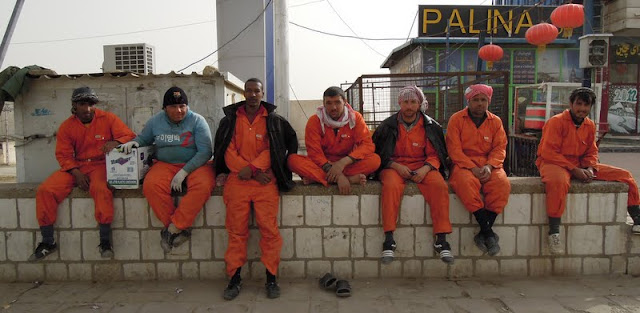[Just in case you were wondering about my last post and how we got the cow out of the garage!! We don't have a garage and she was rummaging through the garbage!!]
I wrote this reflection for CPT Net. Our friend and Muhammed has been (and is continuing to be) an integral part of our team here at CPT Iraqi Kurdistan [note our new name]. He has carried our coal and vegetables up the mountain on his back for a picnic and he has visited Chicago for the CPT 2011 Congress as a representative of our partners here in Iraqi Kurdistan.
Here is a storyI wrote with help from Muhammed.
THE EYES OF 10,000 WERE WATCHING.
An activist friend of CPT Iraqi Kurdistan once said, “Kurdish families are very connected, but also everyone knows everyone in
Kurdistan. When you become an activist you have to be concerned not only about your blood connections but you have to be concerned about 10,000 people who know about you and hear everything you say and watch everything you do.
Muhammed Salah Mahdi, our partner, translator and friend, met CPT in 2006. At that time he was a driver. He noticed quickly that driving for CPT put him into an unusual situation; the team invited him to sit together with them at meetings and asked for his opinion and advice. He took the opportunity to increase his English proficiency which helped him in his other job, an elementary school English teacher. He engaged in discussions with the team: what brought CPT to Kurdistan, what was nonviolent activism and how did it work. Gradually he added to his job description- driver, translator, advisor, friend and activist. The team began to appreciate more and more his ideas and wisdom on how to send out messages to the Kurdish people. He joined together with the team in those actions, such as dressing his truck in signs and an “injured” mannekin to illustrate the message about border bombing and shelling.

On 14 March, 2012 Muhammed came to the CPT house with a plan. This was the day that the new prime minister of Kurdish Regional Government, Nechirvan Barzani visited Suleimani. He came to discuss the split in the government with the opposition party, Gorran (change) List. When Muhammed heard of this visit he decided this was the day for him to become a lone activist without the safety net of saying he was working for CPT. He knew the eyes of the region would be upon him. He expected the media would pick up his message. He hoped that Barzanni would see his lone figure through the tinted glass and think for a moment. His hand written banner read, “Don’t be afraid of reform. Start with yourself. Make history for yourself.”
Muhammed drove his truck out to the gates of Gorran hill. He stood by himself and held the sign for all to see. Barzani’s cavalcade moved past him without any obvious acknowledgement.
But he was right,10,000 eyes were watching. The television media spent more time on his story than Barzani’s visit. Photos and written releases were on many of the Kurdish internet news sites. Muhammed’s family was not very happy with his decision to become part of the limelight. Why did it have to be him to do this action? Why would he put himself into the eye of the government? Did he not remember that such activity can be very dangerous in this society? People from across the region phoned to say they had seen him. Some of these were congratulatory, others wondered of his sanity.
Muhammed is not afraid. He wants a government who listens to the people, who treats them in a fair and wise way. This was a way for him to tell them that message, with the hope that someday corruption will end and real democracy will rule in
Kurdistan.































